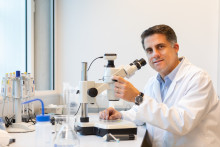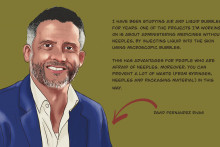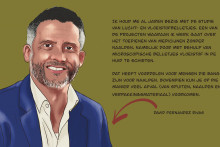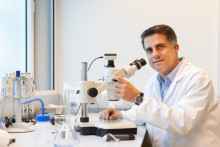What does it feel like to be selected?
‘I’m excited. It’s a privilege. It feels like a challenge and as a pat on the shoulder at the same time. The GYA selects applicants from all over the world to join other motivated members to solve problems of global impact. I have just started. Due to the Covid-19 pandemic, the Annual General Meeting and other activities are done digitally. Nevertheless, it is nice to meet people who are so committed to solving problems beyond their responsibility. All of the members are very busy, but they still find the time to contribute. Being a member is not just honorary. You are expected to roll up your sleeves and work hard. There is a nice little bonus to the membership, also. One of my new colleagues pointed out that “you will be officially young for five years now, no matter your age”.’
Global Young Academy
The Global Young Academy (GYA) is an international society of outstanding young scientists, aiming to give a voice to young scientists across the globe. The number of members is capped at 200, and the membership tenure is five years. New members are selected for their scientific excellence and their commitment to service.
Why did you want to become a GYA member?
‘I come from a developing country and I understand the difficulties that many scientists face today. I like solving problems that are not necessarily in line with my personal interests. Despite all I have achieved, I have this inner drive to contribute to more complex problems, also those not solved directly by science. I want to engage in dialogues with the global scientific community, with politicians and policy makers. Such dialogues could influence decision making processes towards a positive change. Belonging to the GYA will allow me to do that.’
Is there a specific topic or issue that you’d like to advocate within GYA?
‘I’d like to advocate entrepreneurship. I want to create opportunities for scientists to be more daring and innovative. I have already joined the working group focused on fundraising. Money can’t solve everything, but it can help a lot. If you have a good idea, you will most likely need resources to make things happen. I would also like to start my own initiative. I have been studying reports on the presence of microplastics in the environment. I have ideas on how to tackle it, but it is a highly complex issue. Within the GYA, a sort of think tank, I will tackle it more effectively.
Further, there is the sensitive topic of brain drain which I’d like to address. Yes, brain drain is an issue but I think brain hypoxia is worse. One can ask people to stay in their own country, but if a person cannot contribute anything there due to economic or political circumstances, what is the use? You need the knowledge wherever it can make the most difference. And I strongly believe that if one really cares, there is always a way to contribute to solutions back home – no matter where you are. In my head, I never left, and I still advocate for Cuban science and my country.’
Why is it important to have organizations such as the Global Young Academy?
‘It is a neutral platform, there is no governmental influence or monetary gains to be considered. It is not paid, everyone is there voluntarily and if they have an idea, they work on it because they really believe in its potential. It is a group of committed people with strong interest to contribute to change. And there are not that many of those.’
David Fernandez Rivas
David Fernandez Rivas is an assistant professor at the Mesoscale Chemical Systems (MCS) group at the UT. He has created two start-up companies, BuBclean and InkBeams. Last year, he received an ERC Starting Grant from the European Research Council for his research on needle-free injections, by ‘pushing’ liquid into the skin using laser-made bubbles.








